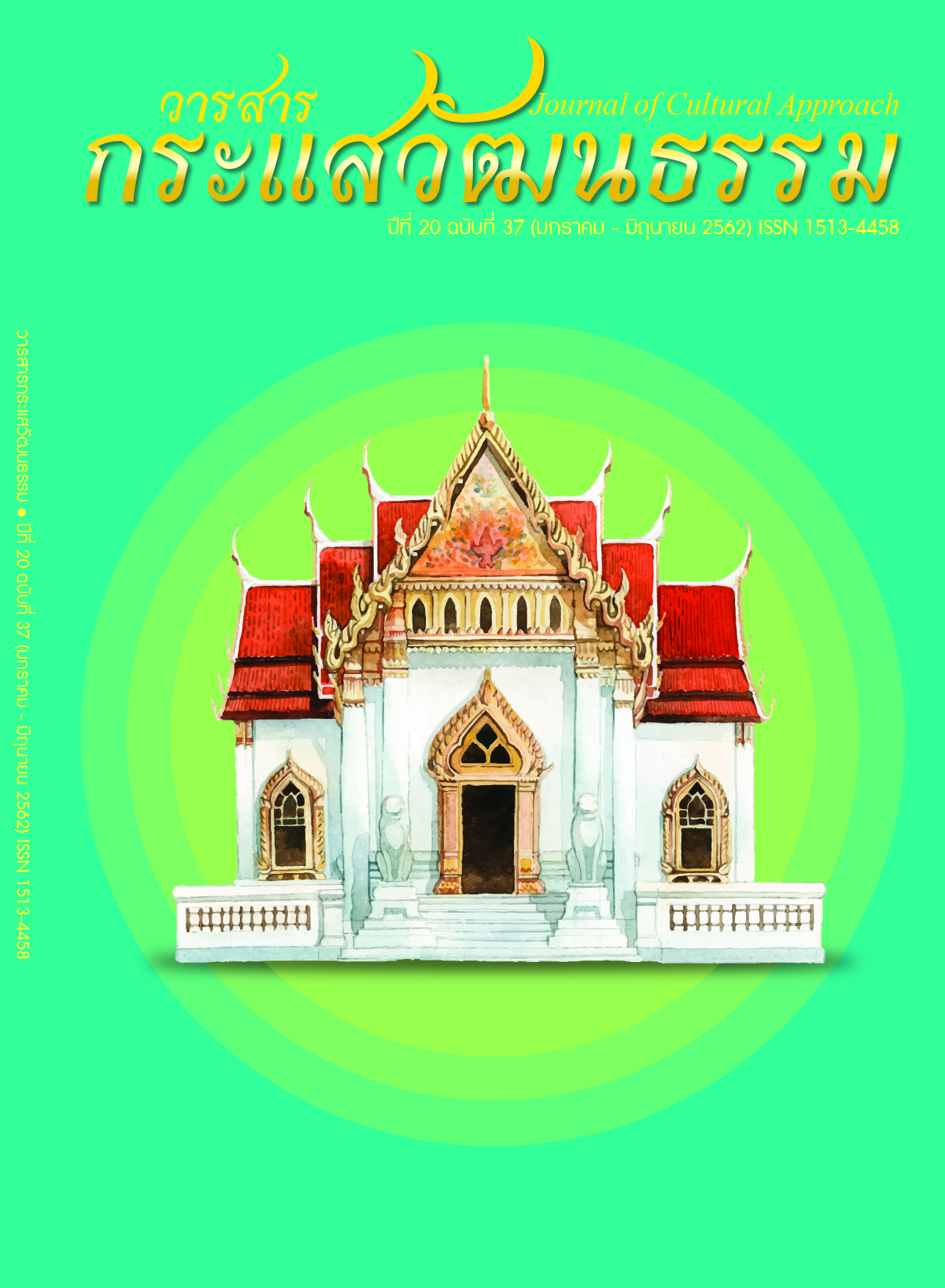แนวทางการประยุกต์ภูมิปัญญาพื้นบ้านอีสานในการผลิตภาพยนตร์สั้นเชิงสร้างสรรค์ทางวัฒนธรรม
Main Article Content
บทคัดย่อ
การวิจัยเรื่องแนวทางการประยุกต์ภูมิปัญญาพื้นบ้านอีสานในการผลิตสื่อภาพยนตร์สั้นเชิงสร้างสรรค์ทางวัฒนธรรมมีจุดมุ่งหมาย ดังนี้ 1) เพื่อศึกษาสภาพปัจจุบันปัญหาของภูมิปัญญาพื้นบ้านอีสานใน การวิจัยเรื่องแนวทางการประยุกต์ภูมิปัญญาพื้นบ้านอีสานในการผลิตสื่อภาพยนตร์สั้นเชิงสร้างสรรค์ทางวัฒนธรรมมีจุดมุ่งหมาย ดังนี้ 1) เพื่อศึกษาสภาพปัจจุบันปัญหาของภูมิปัญญาพื้นบ้านอีสานในการผลิตสื่อภาพยนตร์สั้นเชิงสร้างสรรค์ทางวัฒนธรรม และ 2) เพื่อศึกษาการประยุกต์ภูมิปัญญาพื้นบ้านอีสานในการผลิตสื่อภาพยนตร์สั้นเชิงสร้างสรรค์ทางวัฒนธรรม การวิจัยครั้งนี้ผู้วิจัยใช้พื้นที่ภาคอีสานที่มีการใช้ภูมิปัญญาพื้นบ้านอีสานในวิถีการดำเนินชีวิตที่เกี่ยวข้องกับความเชื่อ ประเพณีและศิลปวัฒนธรรม ได้แก่ จังหวัดมหาสารคาม จังหวัดกาฬสินธุ์ จังหวัดขอนแก่น จังหวัดร้อยเอ็ดและจังหวัดยโสธร กลุ่มตัวอย่างที่ใช้ในการวิจัยเป็นกลุ่มผู้ทรงคุณวุฒิ ได้แก่ ผู้กำกับภาพยนตร์ นักวิชาการ ผู้อำนวยการสร้าง ทีมงานในกองถ่ายภาพยนตร์และกลุ่มบุคคลทั่วไปจำนวน 82 คน แล้วนำเสนอผลการวิจัยโดยการพรรณนาวิเคราะห์
ผลวิจัยพบว่า ประวัติของผู้สร้างและผู้กำกับภาพยนตร์เป็นผู้ที่มีความรู้ความสามารถในวงการภาพยนตร์อย่างยาวนานและมีผลงานเป็นที่ประจักษ์มีความเข้าใจในสภาพของปัญหาในปัจจุบันในการผลิต ผลวิจัยพบว่า ประวัติของผู้สร้างและผู้กำกับภาพยนตร์เป็นผู้ที่มีความรู้ความสามารถในวงการภาพยนตร์อย่างยาวนานและมีผลงานเป็นที่ประจักษ์มีความเข้าใจในสภาพของปัญหาในปัจจุบันในการผลิตภาพยนตร์สั้น โดยใช้เกณฑ์ทั้ง 7 ด้านประกอบด้วย 1) ทุนในการสร้างภาพยนตร์ 2) การคิดเนื้อเรื่อง/โครงเรื่อง 3) นักแสดง 4) ฉากและสถานที่ 5) ทีมงาน 6) อุปกรณ์ที่ใช้ในการถ่ายทำ และ 7) ระยะเวลาเข้าไปศึกษาเพื่อหาแนวทางการประยุกต์ภูมิปัญญาพื้นบ้านอีสาน กล่าวโดยสรุปเพื่อให้การสร้างสรรค์สื่อภาพยนตร์สั้นเชิงวัฒนธรรมสามารถก้าวเดินต่อไปได้ยังต้องอาศัยภูมิปัญญาชาวบ้านที่มีอยู่และเป็นทุนเดิมมาประยุกต์ให้เกิดประโยชน์ให้มากที่สุดและที่สำคัญต้องเกิดการรวมตัวกันของกลุ่มผู้สร้างสรรค์ภาพยนตร์เพื่อปรึกษาหารือและหาแนวทางในการแก้ไขปัญหาร่วมกัน จึงจะทำให้วงการภาพยนตร์ที่สะท้อนความเป็นวัฒนธรรม อยู่รับใช้สังคมไปตราบนานเท่านาน
Article Details
Proposed Creative Commons Copyright Notices
1. Proposed Policy for Journals That Offer Open Access
Authors who publish with this journal agree to the following terms:
- Authors retain copyright and grant the journal right of first publication with the work simultaneously licensed under a Creative Commons Attribution License that allows others to share the work with an acknowledgement of the work's authorship and initial publication in this journal.
- Authors are able to enter into separate, additional contractual arrangements for the non-exclusive distribution of the journal's published version of the work (e.g., post it to an institutional repository or publish it in a book), with an acknowledgement of its initial publication in this journal.
- Authors are permitted and encouraged to post their work online (e.g., in institutional repositories or on their website) prior to and during the submission process, as it can lead to productive exchanges, as well as earlier and greater citation of published work (See The Effect of Open Access).
Proposed Policy for Journals That Offer Delayed Open Access
Authors who publish with this journal agree to the following terms:
- Authors retain copyright and grant the journal right of first publication, with the work [SPECIFY PERIOD OF TIME] after publication simultaneously licensed under a Creative Commons Attribution License that allows others to share the work with an acknowledgement of the work's authorship and initial publication in this journal.
- Authors are able to enter into separate, additional contractual arrangements for the non-exclusive distribution of the journal's published version of the work (e.g., post it to an institutional repository or publish it in a book), with an acknowledgement of its initial publication in this journal.
- Authors are permitted and encouraged to post their work online (e.g., in institutional repositories or on their website) prior to and during the submission process, as it can lead to productive exchanges, as well as earlier and greater citation of published work (See The Effect of Open Access).
เอกสารอ้างอิง
[2] Boonyaketmala, Boonrak. (1990). Seventh Art For the Cultural of Film Criticism. Bangkok: Printing Font.
[3] Chansoon, Samart. (1991). What is Local Wisdom?… About Folk Wisdom. Bangkok: Teachers Council Lat Phrao.
[4] Chantavanich, Supang. (2012). Qualitative Research Method. Bangkok: Chula Press.
[5] Chanthachon, Songkhun. (1997). Cultural Qualitative Research. Kalasin: Printing Coordination.
[6] Kaewthep, Kanchana. (1997). The Science of Media and Cultural Studies. Bangkok: Edison Press Products.
[7] Phonsi, Sonthaya. (2004). Theories and Principles of Community Development. Bangkok: Odean Store.
[8] Prohmvitak, Pakorn. (2015, November 22). Advanced Film Production. Retrieved from http://www.thaifilm.com.
[9] Santasombat, Yot (1994). Biological Diversity: Social and Ecological Dimensions. 2nd ed. Bangkok : Community Development Institute.


